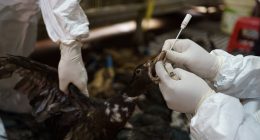
MBC, the Saudi-owned free-to-air satellite network giant, has been a dominant force across the Arab-speaking world for three decades and is now arguably the Middle East’s most recognizable media brand.
With a reach of hundreds of millions of viewers and now offering more than 10 channels, it has been behind an influx of Western TV to the region, plus its own hugely popular Arabic dramas, sitcoms and chat shows, along with local spin-offs of some of the biggest franchises, such as Arab Idol, Arabs Got Talent and Who Wants to Be a Millionaire. But only now — 30 years after first launching in London (it moved to Dubai in 2002 and recently began shifting its operations to Riyadh) — is it making a major play for Hollywood and a global English-speaking audience with two big-budget A-list features.
Desert Warrior, a period epic set in 7th century Arabia, stars Anthony Mackie, Aiysha Hart, Sharlto Copley and Ben Kingsley and comes from writer-director Rupert Wyatt (Rise of the Planet of the Apes). Now shooting in Neom in Saudi Arabia’s Tabuk region, an area that has been earmarked as the site of a much-hyped $500 billion mega city, it is the biggest film production ever filmed in the country.
Meanwhile, Kandahar — an action thriller about a CIA operative starring Gerard Butler and from his Angel Has Fallen and Greenland writer-director Ric Roman Waugh — is due to start production in the coming days in AlUla, a historic region of Saudi Arabia that has been heavily promoting itself as a shooting destination (its own film commission launched earlier this year). Kandahar will be the biggest film to shoot in its entirely in the kingdom.
Given that it was only in late 2017 that Saudi Arabia declared its emergence from a self-imposed 35-year cinematic exile, overturning a ban on cinemas and beginning to examine the prospect of its own film industry, it’s unsurprising that records are quickly being broken.
But what’s especially significant with these two productions is that they are the first major English-language features being co-produced and financed by MBC’s high-end production arm MBC Studios (first launched in 2018 and led by former NBCUniversal International head Peter Smith) and that it is teaming with major Hollywood players in the process.
In the case of Kandahar, MBC Studios — which Smith said was making a “substantial investment” in the film — co-produces with Butler’s G-Base (London Has Fallen, Greenland), Thunder Road Pictures (John Wick, Sicario) and Capstone (The Courier, Spinning Gold), which is also selling. For Desert Warrior, MBC Studios — also believed to be the primary financial backer — is co-producing alongside JB Pictures (led by Jeremy Bolt, who produced the Resident Evil franchise) and AGC Studios (Midway, Moonfall), which is handling worldwide sales).
“It’s definitely a new era,” says MBC Studios KSA managing director Zeinab Abu Alsamh, speaking to The Hollywood Reporter. “Not just for MBC, but for the whole region. There is definitely a boom in production and this is just a natural evolution. We want to have this region as a hub for production and we want to make up for all the time that we haven’t been producing.”
Since 2018 and the infamous corruption crackdown that saw many members of the Saudi business and ruling elite detained at Riyadh’s Ritz-Carlton hotel under orders of then new Crown Prince Mohammed Bin Salman, the MBC Group has effectively been in Saudi government hands. The company’s founder and chairman Waleed bin Ibrahim Al Ibrahim was among those caught up in the crackdown, and it was widely reported that his release was secured following the transfer of 60 percent ownership of his company to the government.
Given that it now has deep-pocketed owners with grand media plans (the country said in 2018 it was to invest $64 billion over 10 years into its entertainment sector), many might assume MBC has whatever resources it needs to throw at as many films as possible. But Abu Alsamh says that isn’t the case, and that they’re still taking a very long time to ensure they’re investing in the right projects and developing the stories they think should be developed.
“I’m not pressurized by the number of things that need to come out,” she says. “I really am keen to have good stories written. I’m keen on having a sustainable way of transferring the knowledge of all the great global talent that we’re working with to locals to build infrastructure that’s actually attractive to anyone that wants to come and shoot.”
This is one of the main priorities. With Saudi Arabia building a film industry effectively from scratch, current productions are having to bring key crew members, particularly department heads, in from overseas. But the hope is that each time they come, local talent are able to shadow experienced Hollywood hands, work in different areas of production and learn on the job.
“And we’ve done that with Desert Warrior,” says Abu Alsamh, claiming that the film is an “anchor” to help develop Saudi crews. In just a week since shooting began, she says they have already seen a “huge jump in knowledge.”
It’s the same with actual facilities, also severely lacking in Saudi Arabia, with the plan being that whatever is built for the bigger productions should remain in place for further use.
“With every production there’s something that stays over,” says Abu Alsamh. “For Desert Warrior we made a lot of improvements, and now we’re planning another project in the same location. And, man, is it easier thanks to them having already overcome the biggest battle.”
Although both Desert Warrior and Kandahar are being shot in Saudi Arabia, Abu Alsamh indicates that, while this would obviously be preferred, it isn’t necessarily the proviso for future film investments, but again the ideal scenario would be for the project to be a “Saudi story or about a Saudi figure.”
But could MBC conceivably begin financing Hollywood productions outside of Saudi Arabia that have nothing to do with the country?
“Things are opening up, so I can’t say, ‘no,’ says Abu Alsamh. “But there isn’t anything like that on the table yet. But maybe soon.”
Major upcoming projects that MBC Studios is set to produce and finance, according to Abu Alsamh, include The Ark, which she says is a modern-day story of the archeological efforts to uncover Noah’s Ark. There’s also another cinematic retelling of the famed One Thousand and One Nights collection of Middle East folk stories, plus a biopic of famed pre-Islamic Arab knight and poet Antarah ibn Shaddad al-Absi. While no director has yet been attached, The Ark is expected to be the first out of the block.
But for the next few months, at least, MBC has both Desert Warrior and Kandahar to keep itself busy. Alongside the records that they’re breaking, the films are also hugely significant as indicators that Hollywood companies, producers and actors are once again openly happy to work with Saudi Arabia again after several years publicly out in the cold following the 2018 murder of Washington Post journalist Jamal Khashoggi, which was attributed to agents of the Saudi government.
Butler, notably, was one of the very first stars to cancel a planned promotional trip to the country just days after the Khashoggi scandal erupted in October 2018. Three years on, he’s starring in and producing one of the biggest films ever shot in Saudi Arabia, a film financed by a company majority owned by the same government accused of being behind the murder.
Despite owning a controlling stake, one industry insider claims that authorities actually have little influence over MBC Studios, with the government having agreed to “not interfere” with MBC’s premium content and production arms (which also includes streaming service Shahid VIP) as part of the takeover. Also, unlike Saudi’s growing array of state-owned assets — which includes stakes in Disney, Live Nation, Boeing, Facebook, BP, Uber, Starbucks and the recently acquired U.K. soccer team Newcastle United — MBC isn’t part of the Private Investment Fund, the vast sovereign wealth fund estimated at $500 billion. Instead, it falls under the Ministry of Finance, something that, according to the insider, actually gives it more “maneuverability” away from the “more exposed” brands under the wealth fund.
Saudi-based investment extends to the parent company of The Hollywood Reporter, it should be noted. SRMG, a publicly traded media firm in Saudi Arabia, is a minority investor in PMC, co-owner of The Hollywood Reporter.
According to Abu Alsamh, MBC’s connections to Salman and the Saudi government haven’t been a hindrance in attracting Hollywood talent.
“Not quite, because it’s owned by an investment fund and we operate very privately, so I don’t think that narrative is stopping anyone,” she says, adding that the pool of U.S. and U.K. directors and writers the company is speaking to about future projects is “getting bigger by the day.”
And while Abu Alsamh doesn’t claim to have a set target for how many major English-language features MBC Studios is planning to produce, she does note that Desert Warrior will be the “first of many.”
Source: HollyWood







